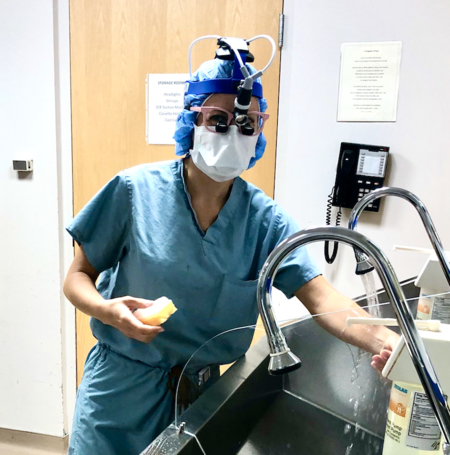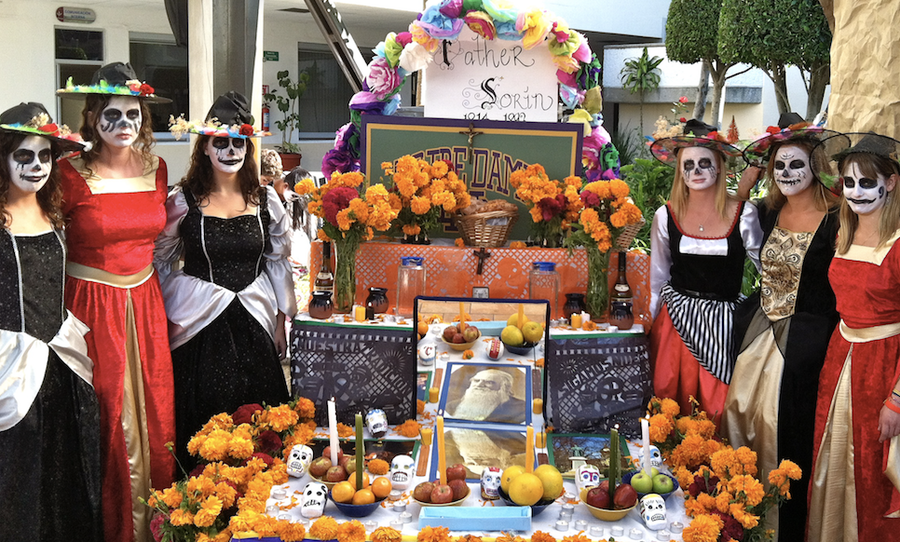Puebla alumni series: Megan Finneran ‘13

Megan Finneran is a 2013 Notre Dame graduate who majored in pre-professional studies and Spanish. She received her masters in global health from Notre Dame. Finneran is currently in her third year of a neurosurgery residency at BroMenn Medical Center in Bloomington, IL. She reflects on her time abroad in Puebla and how the experience led to other healthcare opportunities around the world.
It was Puebla where I mastered Spanish, immersing myself in the language like never before. In medical school during rotations at Cook County Hospital in Chicago, physicians and nurses would pull me into rooms to translate for the plethora of Spanish-speaking patients with whom the vast majority of providers could not communicate. From a loving family greeting you at the dinner table to ask about your day in Spanish to learning histology and reading for a literature course alongside native classmates, the brain adapts more than any classroom Spanish course can ever produce.
Beyond the language, the Puebla program has features unlike any other study abroad program. The OR in the General Hospital of Cholula was where my dreams of becoming a surgeon were solidified. It offers an opportunity to explore medicine in a hospital setting and truly learn if it is the career path meant for you. At the same time, you will see how local healers, called curanderos, treat patients outside the hospital walls. When I close my eyes I can still smell the mint paste my host mom rubbed on my back one night to help with a searing migraine just as clearly as I can hear the screaming baby I helped deliver at the hospital.
Of course, when it becomes a little too much and you need a fix of home, you are surrounded by a handful of Notre Dame classmates with the exact same feelings who can always provide an English-speaking break. Part of the charm of studying in Mexico is the smaller group, which allows you to get to know your classmates as you all travel through the country, exploring its cities on weekends. Lisette, the Notre Dame coordinator in Puebla, goes above and beyond. Her friendly face will be there to help navigate every situation.
My favorite memory from Puebla involves Día de los Muertos, or Day of the Dead. It was a holiday I knew occurred around our American Halloween but did not know many other details. When we learned the university had a contest for ofrendas, or altars used to honor the dead, I knew we had to compete. We spent the weeks leading up to the contest talking to classmates, host families, and physicians at the hospital to learn about the day. Lisette took us around to buy flowers, mirrors, skulls, bread, and treats to cover our ofrenda in honor of Father Sorin. I have no idea from where, but we conjured up dresses, hats, and face paint for all the girls to dress as La Catrina, the famous Día de los Muertos skeleton. Out of over twenty groups, the Americans won third place, which undoubtedly won a handful of perplexed cheers.

I cannot say enough good things about my time in Puebla. I still keep in touch with my host mom, who made me caramel crepes on bad days and hugged me like my own mom. My time in Puebla gave me courage to explore the world outside the Midwest and the ability to do it in Spanish-speaking countries.
After Puebla I went on to work on construction of a school in Guatemala, interpret for and assist in medical clinics in Nicaragua, and perform research on the healthcare system in the Amazon region of Ecuador. One of my classmates from Puebla continued on at Notre Dame for the Global Health Masters program and also did his research in Ecuador. At the end of our research period, we spent a week living on a boat touring the Galapagos and another week in Peru climbing Machu Picchu.
In medical school my best friend and I went to Cuba after we took our board exams. We even spent a month working at a hospital and operating in rural clinics on weekends in Cameroon. (I figured the romance language root of Spanish would help me with French. It didn’t!). At the end of medical school I worked with neurosurgeons in Córdoba, Argentina. Medical Spanish is almost a language of its own and my experience in Puebla equipped me to communicate with patients and engage in surgeries with the team.
Becoming proficient in Spanish will open doors you have never even imagined. You will find more opportunities and be able to communicate with taxi drivers, servers, and random people on the street. The language will help you unlock secrets all over the world. It may even help you unlock them in your own backyard.
Learn more about opportunites in Puebla.
Originally published by at mexicocity.nd.edu on March 18, 2021.